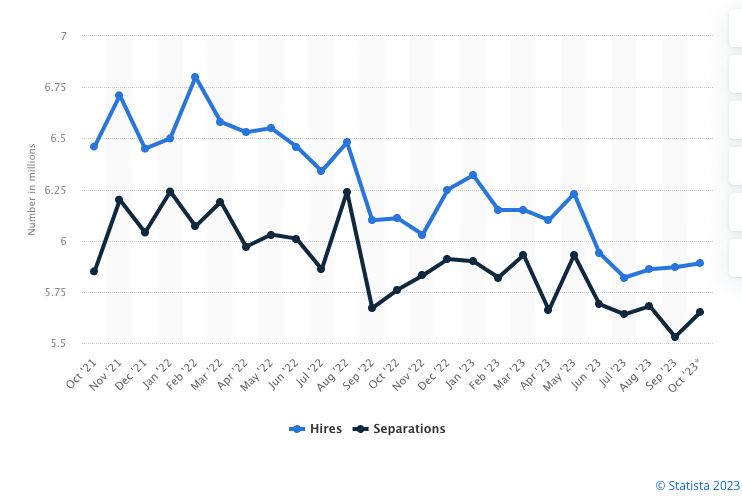I find it interesting that so many people are concerned when someone gets laid off in December but don’t even notice when they get laid off in March or September. “OMG! How could a company be so heartless to lay off staff right before the holidays!?”
In reality, getting laid off at any time sucks! The time of year has very little to do with timing. When you look at the average layoffs by month, over time, companies do fewer layoffs in December on average. Again, this data is particular to industry and economic timing and has very little to do with the month of the year.

The chart above shows total separations, which includes layoffs, in recent months. You can see that hiring and separations follow the economy, not the seasons. Unless, of course, your hiring is seasonal. Again, this is all baked into the overall numbers.
Should you do layoffs during the holidays?
Here’s my unpopular take. You lay off people as soon as you know you have to protect the business and as many jobs as possible to remain healthy and viable. Being good at business is about making the right business decisions. If you kill the business, you will kill every job.
Sometimes, those layoffs have to happen when it seems heartless. “What’s the difference of a few weeks!?” Maybe that difference is another dozen people getting their notice and the company being less viable. The goal should be to save as many jobs as possible.
Layoffs are a negative situation every time they happen. What you hope to do is make a negative situation the least possible negative for all involved who are trying to maintain the success of the business. To give them as many resources as possible to make it work. If that means we lay off people during the holidays, it’s going to suck, but that is the right decision.
As I said, it’s an unpopular opinion, but it’s the right one.
The tech industry is getting pounded right now for doing layoffs, and many are happening during the holidays. Many of these tech companies got caught up in a new reality around raising money when interest rates shot up. Most are finding it extremely hard to raise money to maintain their businesses and are forced to cut expenses. This is their business reality. They overhired in previous years when interest rates were near zero, and VCs were throwing money at them, and they shouldn’t have done this. They are now paying the price to try and become profitable.
This is Capitalism. For how much it can suck, I still prefer it to all the alternatives. You have amazing upside, but that means you also have down side risk when you don’t run your business to spend less money than you actually bring in. Many in the workforce in the tech sector have never experienced this, so this is extremely hard to take when it’s your first time.
Layoffs don’t happen by month or holiday. They don’t happen because some executive is trying to be cruel. Layoffs happen when business financials are failing, and something has to be done to save as many jobs as possible and cut expenses. Those times come when they come, and it has almost nothing to do with the calendar.
